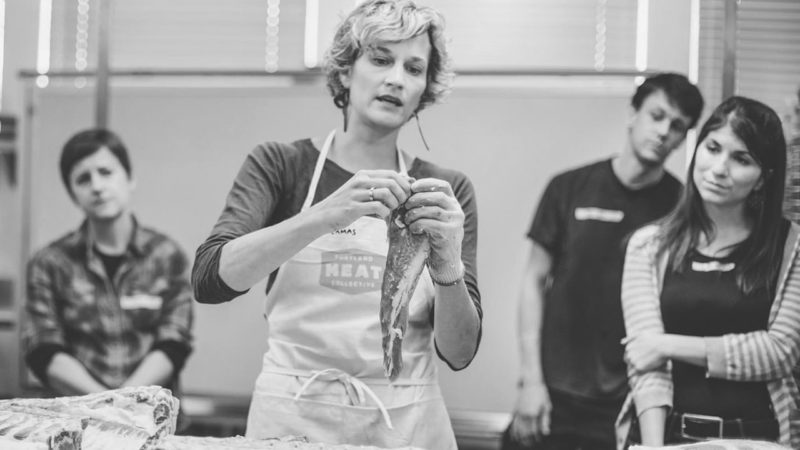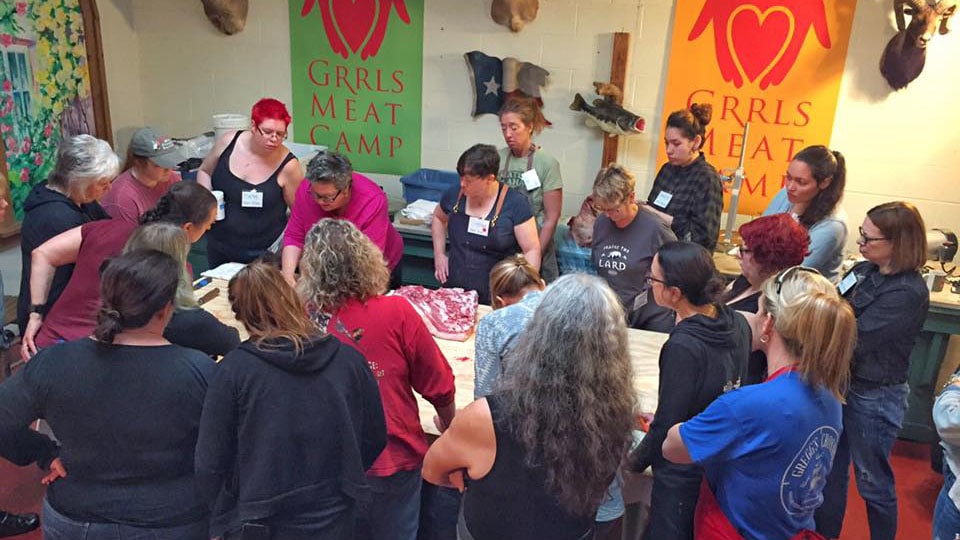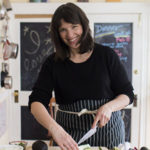Last Updated on March 1, 2022
In 2009, Camas Davis moved to France to learn how to butcher whole animals and make charcuterie. After over a decade working as a food writer and editor, Davis was looking for hands-on work in food, she says. Apprenticing with Kate Hill, a professional cook and teacher based in Gascony in Southwest France exposed her to a transparent, ethical, and creative approach to meat production and consumption, and inspired Davis to found the Portland Meat Collective when she returned home to Oregon.
In the decade since, the meat landscape in the U.S. has changed dramatically. Environmental advocates are raising the issues of meat production’s effect on land and climate; companies are bringing plant-based meat substitutes to market; and an expanding segment of consumers want to know more about where and how their meat was raised—and how those factors will impact their health and their budget.
Addressing those consumer questions was part of Davis’s mission when she founded the PMC as a hands-on, transparent meat school. When she got home from France, she says, “I realized there wasn’t really a consumer base to support whole animal butchery and buying—but it’s so important to have that to support the farmers.”
To that end, the school holds classes on pig and poultry butchery, sausage and charcuterie making, and invites students to witness or participate in animal slaughter on partner farms. When consumers are brought into these processes, Davis says, they can develop a clearer sense of everything that goes into bringing sustainably-raised animal protein to the table.
But Davis’s work has gone beyond addressing eaters; in 2014 she founded the Good Meat Project; a non-profit organization with a mission to build pathways to responsible meat production and consumption. GMP programs address the needs of eaters, food professionals, and ranchers.
One of the GMP programs that brings all three different stakeholders together is Grrls Meat Camp, an initiative of in-person retreats and workshops (started by Davis’s mentor Kate Hill) and online community of women with a shared interest in food animals and meat. In the past decade, according to the Bureau of Labor Statistics, over 10,000 women have entered the meat and seafood market sector. In a male-dominated industry, says Davis, it’s helpful to have a “sisterhood” of women with shared values who can support each other’s career goals within the field.
Anna Perez’s career in butchery and charcuterie production was sparked when, while working at a zoo in New Orleans, studying computer science, and making charcuterie at home, she helped a friend working in a restaurant butcher a whole pig. The next thing she knew, she was heading to Calvert, Texas to attend her first-ever Grrls Meat Camp in 2017. Soon after, she landed a position at a meat counter in a grocery store.
Months later, after seeing a post on the Grrls Meat Camp Facebook page, Perez interviewed for a position doing whole animal butchery, accepted an offer, and moved from New Orleans to Denver for the job. Three years since helping break down that pig with her friend, she’s now a manager at Elevation Meats, an award-winning artisan meat and charcuterie company in Denver. Grrls Meat Camp helped Perez move quickly into a new career, she says, and, “the friends you make, it’s insane.” “You know you’re going to be friends with these people forever.”
And as women join the meat industry, says Davis, they’re also entering the farming and ranching scene, and “almost all these women are seeking out alternative methods of production,” she says. Meat camp integrates these women into the program, both to share their practices and connect them to potential markets for their animals.
“There’s so much out there that scares us about meat, and rightfully so,” says Davis. But the growing number of women entering the field and creating a wider market for transparent and sustainable sources of meat is not one of those things.
Camas Davis is the founder of the Portland Meat Collective, and the author of Killing It, which tells the story of her wild adventures in the world of meat. Featured image by Sean Linehan.
Leigh Belanger is a writer, editor, and culinary expert with a passion for food, storytelling, and sustainability. As an Editorial Director for ButcherBox, she has crafted engaging content that highlights high-quality ingredients, delicious recipes, and the joy of home cooking. Through her work, Leigh inspires people to cook thoughtfully and creatively.




